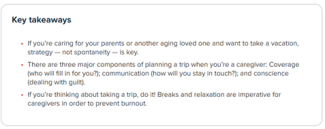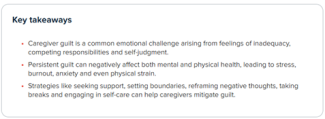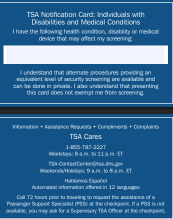Summer traveling can good for your well-being, so do it
Traveling to new places is good for everyone. If you’re feeling stressed at work or from caregiving, a vacation can be the best solution. Traveling can improve your mental health by:
- Helping you feel calm and reduce stress
- Alleviating symptoms of anxiety and depression
- Allowing for regular resets
- Improving your mental power and brain function
- Increasing your creativity
Read more: https://www.webmd.com/mental-health/how-travel-affects-mental-health
Despite everything you are juggling, you can get away. Here's how to take a vacation (guilt-free) when you're a caregiver.
- Plan a vacation. Having something to look forward to when you make a plan creates happiness and excitement.
- Make a tradition out of it. After traveling, you’re more likely to feel clearheaded and ready to take on whatever’s waiting for you at home.
- Explore new places. Your empathy increases when you go to places you've never been before and experience other cultures. This helps you feel more appreciative of your surroundings when you return home.
- Make it personal. When traveling, go where you want to go. Traveling for pleasure, not work, has greater benefits.
- Size doesn’t matter. You can make your travel plans big or small. They don’t have to be expensive or exotic for you to get the most mental health benefits from them.
Rose Reif, owner of Reif Counseling Services in Cary, N.C., breaks the coverage planning into four easy steps:
- Find a reliable, temporary caregiver.
- Show them how to provide care, including.
- administering medication
- arranging transportation
- assisting with daily living activities
- preparing meals
- write down everything, and include pictures if you can
- physically do the activities with them present, explaining why you’re doing what you’re doing and answering their questions
- Before you go, have the temporary caregiver fill in while you are present.
- If time allows, do a trial run, in which you have the caregiver fill in with you nearby but not on-site.
Coverage: Finding a temporary caregiver to fill in
- Ask a sibling, family member or friend to fill in: If your siblings live in another city or state, there are ways to make a short-term care arrangement work. Since they are not able to be present and involved in day-to-day care, they may welcome the opportunity to schedule their visit to cover your vacation time.
- Hire a temporary caregiver: While it may be easier for everyone if your parent is familiar with the fill-in caretaker, it’s not a requirement. At a minimum, introduce the temporary caregiver to your parent in advance so they can start to get comfortable with each other.
- Find respite care: Look into a short-term respite stay for your parent. Many assisted living and skilled rehab facilities and skilled nursing homes offer weeklong stays. Call facilities near you and ask about availability and rates.
Make sure to prepare your coverage
For peace of mind, especially your own, take the time to thoroughly prepare the temporary caregiver about all your parent’s caregiving needs.
- Write a detailed list(s) of instructions.
- Portable medication list including dosing
- Physicians contact information and clinic address
- Location and/or copies of important papers including advance directives and DNR, emergency contact.
- Consider HIPAA, the Health Insurance Portability and Accountability Act. Your caregiver must be on record to take your loved one to the hospital, doctor or other medical facility. Additionally, they need to be on record to receive health information in your absence. Don’t forget the obvious: insurance information, a list of medications and ailments, contact information of all physicians and medical facilities that you use, as well as location, directions.
Communication: Staying in touch while you’re away
Once you’ve found a fill-in caregiver, think about how you will be in touch during your vacation. Ask yourself the following questions:
- Do you want daily updates?
- Will you make yourself available to answer questions?
- Do you only want to be contacted in an emergency? If so, be clear about what constitutes an emergency in your mind.
You also need to think about and plan for how the temporary caregiver will communicate, if needed, with any medical personnel.
Conscience: Dealing with caregiver guilt
Perhaps the most challenging part of taking a vacation as a caregiver is giving yourself permission to get away. Maybe you’re worried that your parent doesn’t like the idea of you leaving, even if only for a few days, and so therefore you should stay home. Don’t let guilt win. Remind yourself that you deserve a vacation, let your parents know you are taking it and resist the urge to justify your decision. You can’t control everything that happens in your parent’s life, and whatever might happen while you are away could just as easily happen while you are home.
The bottom line
Even if you’re the primary caregiver for your aging parent, a vacation is possible — and crucial for maintaining your mental health. It takes some work, but once you’ve planned for coverage, communication and your conscience, the only thing left to plan will be your vacation itinerary. https://www.care.com/c/take-vacation-elder-caregiver/
Traveling with a Senior Loved One
To-Do List for Traveling Seniors
Here's what the CDC says seniors should do before traveling:
- Get a travelers' health policy to cover insurance gaps. This is especially important for those on Medicare or Medicaid, which may not pay for treatment abroad.
- On long plane trips, walk around periodically and drink lots of water. A rare but potentially dangerous condition called deep vein thrombosis can develop in those who have spent long periods of time in the cramped spaces of airliners.
- Bring enough of your medications for the entire journey. Pack each type of medication in its original container. Also take a copy of your prescription. It is also a good idea to take note of the generic names of your medications, in case you have to buy more while traveling.
- Pack medicines and extra eyeglasses in your hand luggage. If your medication is crucial, have a backup supply in your checked luggage. check the TSA’s rules,
- If you have a unique medical condition or suffer from allergies, wear a bracelet marked with the appropriate information.
- If traveling internationally, ask for help at any U.S. embassy or consulate. The staff will give you a list of local medical professionals.
- Follow public health guidance resources The Centers for Disease Control and Prevention cdc.gov/travel
- Choose a hotel that meets your needs for accessibility
- Don’t be a target for theft
- Before leaving home, make copies of your important documents, like your passport, driver’s license, Medicare card, and itinerary and keep them on hand
- Don’t publicize your trip on social media while away strict privacy settings enabled,
- Check the option for priority boarding and dietary restrictions
RESOURCES:
Smart Traveler Enrollment Program (STEP): Enroll at step.state.gov to receive travel and security updates about your destination, and to help us reach you in an emergency.
Safety and Security Information: Read the Travel Advisory and Alerts for the countries you will be visiting at travel.state.gov/destination.
Crisis Planning: Read Crisis Abroad: Be Ready
Health Precautions: Read Your Health Abroad and check out recommendations for vaccinations and other health considerations from the U.S. Centers for Disease Control (CDC) and World Health Organization (WHO).
Money Matters: Before going abroad, notify your bank and credit card companies of your travel, and check exchange rates.
Travel State Gov: https://travel.state.gov/content/travel.html
Bonus: If you’re 75 or older, TSA usually allows you to go through the security pre-check line, which means you don’t have to remove your shoes or separate liquids from your carry-on. For those younger than 75 who can’t stand in long security lines, the TSA Precheck or Global Entry program are options. TSA Precheck is for flights between U.S. airports, and Global Entry is for international flights. Each program has a non-refundable application fee, and you have to apply for the program well in advance of your travel. But if approved, your status lasts for five years.
https://www.tsa.gov/travel/tsa-cares/screening-passengers-75-and-older




